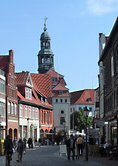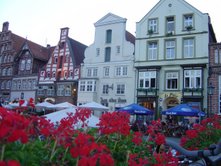
![]()
|
Index
•
|
|
Welcome
•
|
|
21st Century•
The Future |
|
World
Travel•
Destinations |
|
Reviews•
Books & Film |
|
Dreamscapes•
Original Fiction |
|
Opinion
& Lifestyle •
Politics & Living |
|
Film
Space •
Movies in depth |
|
Kid's
Books •
Reviews & stories |
|
|
|
|
The International Writers Magazine: German Life
Paying for the bus was a challenge, without getting a sharp unintelligible comment from the bus driver for not having the right change. Getting on the right bus going in the right direction was an even greater challenge (being a non-bus-rider). There wasn't much I could do, since I didn't even know what street I wanted to go to. Landmarks and familiar buildings were my map. And dodging the bicycles wasn't easy either. They would come wizzing toward you and either you quickly jumped out of the way or if you didn't you would hear bells. “bling! bling!” With Germans, that sound immediately incurs the correct response. To an American, however, who has just arrived in the foreign country and has no clue that the bicycle bell sound is supposed to subconsciously make you step onto the pedestrian side of the sidewalk, it makes the American stand in your tracks, wondering what the hell that bling, bling is. This, in turn, produces the sound of squeaking breaks and of loud or sometimes muttered German, most assuredly non-cordial. Then the American finally realizes where she is, turns and with an expression of sudden fear and a little embarrassment, jumps in the wrong direction. Directly in front of the bike. More loud German and the American finally finds the right place to stand and the ruffled German pedals on, glaring, probably wondering which planet the alien delinquent is from.
Culture Shock – Bells, Burgers and Grannys
• Lois Tietzel
I have been going through culture shock since I got here – over and over again. I am still in culture shock. It has been everything from fulfilling to exhausting and always challenging. It was in the summer of '99 that some German friends dumped me on the corner of a middle-sized German college town with my two suitcases and my quivering excitement and said “Bis bald!” I was looking for the adventure of being culturally shocked, although I didn't know what that would actually entail. But I was finally tasting the unknown and that is what was so enticing and irresistible. I was living my dream, I was being what Ernest Hemingway called the expatriate.
Then it is the food. Culture is food. And food is culture. Thus, getting edible nourishment in a foreign country is a challenge, to say the least. So, if food is culture and culture is food, then food is serious and seriously a challenge.
Being culturally challenged in a challengingly cultural environment is culturally challenging, which is a challenge, culturally.
No eggplant and mushroom quiche for me, thank you. That makes me talk like the above – challenged. Aren't those French inventions, anyway? And forget the sausages – I like to know what I'm eating. I will stick to my diet of hard German farmer's bread and mustard – the two things on the shelves I could actually recognize and that didn't seem to be overpriced. I lived on that for at least a month until I went to some body's garden party and was aghast at what I didn't have on my shelf in the co-op fridge.
After discovering that Germans actually do have white bread (yessss!!) and tortilla chips (oh yeahhhh), and ice tea and chocolate chips cookies (ooowoowooo), even potato salad (ahhhhhhhhhh), my pants started to fit again and things began to look brighter (in the cultural sense of things – the weather was still cloudy). And thank goodness fresh fruit and vegetables are visually universal. The weekly market was like being in heaven. A vegetable, fruit and grain kind of heaven. But not just because I recognized the produce, it was like walking in a postcard of Europe complete with the sounds and smells. And the feelings: occasionally bumping into people and saying “'skewz-me!” to their backs as they continued without noticing anything. (But that's just a European and big city thing.)
Back to produce heaven: Just like you see in the tour guide books: pristine lettuce heads, juicy carrots, cabbage, apples, you name it, being sold by a round, jolly lady with rosy cheeks, strong, dirty hands and an apron. The smell of the smoked sausage being sold on the corner wafted into my nostrils, while the cheese lady's creations made my mouth water. The fruit stand offered free samples and the man smiled so knowingly and nodded as I smiled and raised my eyebrows in appreciation of his strawberries. Further down the square, under the stately observance of the big, beautiful and comforting Lueneburg town hall with clock, I stood in the sun my eyes closed breathing in the smell of carnations, roses and lilies at the flower stand that was bursting with a vivid rainbow of color. I had arrived. All the angst, doubt, homesickness and sadness melted away. I no longer felt challenged or culturally shocked. There was something homey and comforting about the bustle of the the market. Time stood still. It was like the smell of fresh rain on warm pavement or the sound of the wind in a grove of pine trees – it was my oasis. And still is – the market on the town square.
At first, just to do something that seemed familiar, I smiled at people on the street when our eyes connected. Usually I got a puzzled but pleasant smile back. Sometimes I was just ignored. I wondered why people didn't smile as often – where they all in a bad mood? Was it the nasty weather? Did I forget my deodorant? Did they have a thorn in their britches? No, to all the above.
The other thing was that people, especially men, I found, seemed to unabashedly and calmly stare at me or at least take long looks. This unnerved me greatly at first – scary freaking Germans! Then I found it to be a nice compliment – they didn't say anything or whistle, it was just looking – nice gentlemanly Germans! Then I noticed women doing it – everyone did this to everyone else.
Ok, I thought, they are all way too psycho: first, they screw up their face when you smile at them, then they stare at you without blinking. Where AM I?! I was quite confused: should I strike up a conversation with the lady in the grocery line or should I try small talk with the guy waiting for the bus? None of this was even possible, since I was not in command of the language anyway. Or should I just do as they do – ignore and be ignored? I can't – it's not me, I thought. And I noted that most people didn't talk to each other – there was no friendly chatting between strangers or short sentences exchanged – none of the daily “How's it going? - Good, thanks, and you? - Fine, thank you.” - This was disconcerting and uncomfortable for me.
The short social interaction was minimal and strictly formal and functional. I was almost thinking of either calling it quits or chatting up the cashier at the grocery store in English when I witnessed something that began to change my outlook: our bus came to a lurching halt, the old lady with her walker and her basket of groceries almost toppled over, even us students had to hang on while standing. The doors opened and people began to push their way to the exit. I waited to see what the old lady would do. She shakely shuffled her walker toward the open doors, head down, her ankles wobbling. All of a sudden, two men in street worker clothes, slipped passed her, jumped out turned around and silently offered their strong arms for Granny to take hold of, taking walker and all down and over the curb to a safe, solid landing on the sidewalk. She murmured a weak “Danke” and smiled shyly, while the men, nodded quickly and hopped back onto the bus, reassuming their standing positions near the window. No one except me had watched so intently, I think. No one else seemed to have noticed at all. I was amazed – all this time I thought everyone one was just out for themselves and not paying attention to what was going on, oblivious to the humans around them. Not so.
That little example and the normality with which everyone treated it made a few things clear to me: It wasn't that the Germans were hard, cold and mean. They were a little more reclusive maybe in their behavior on the street, but when it came down to it, they would jump up to help without hesitation. A few days later, I experienced a similar situation when I had to take my heavy bike on the bus. And things started happening that I hadn't realized before: people started to smile back when I flashed my teeth in passing. It wasn't that big, fake, “How are you? Leave me the hell alone.” smile that I was used to flashing. It was a “Are you having the same struggle today as I am? It's OK, it'll get better.” I can't explain it, but I distinctly remember feeling exactly that silent exchange of good will while looking into the eyes of a stranger one day while hurrying through the streets of Lueneburg.
It must have been the sincerity they saw in my face that made them smile back – the sincerity of wanting to connect, of feeling comfortable enough with myself to let it show, of taking that first step.
© Lois Tietzel June 2008
loistietzel@yahoo.de
Lois Tietzel lives in Northern Germany, writing and painting many of her experiences as a volutarily displaced American.
More Life Moments
Home© Hackwriters 1999-2008
all rights reserved - all comments are the writers' own responsibiltiy - no liability accepted by hackwriters.com or affiliates.


